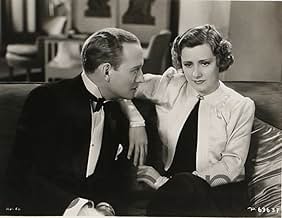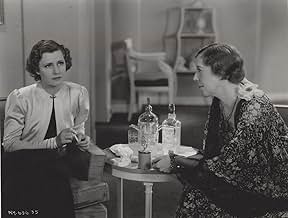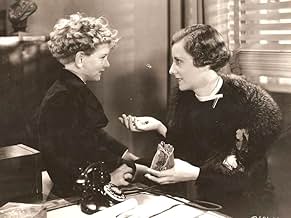Adicionar um enredo no seu idiomaA prison reformer and a controversial judge fall in love and have a child out of wedlock.A prison reformer and a controversial judge fall in love and have a child out of wedlock.A prison reformer and a controversial judge fall in love and have a child out of wedlock.
- Direção
- Roteiristas
- Artistas
- Prêmios
- 2 vitórias no total
J. Carrol Naish
- Dr. Sorelle
- (as J. Carroll Naish)
Rafaela Ottiano
- Mrs. Feldermans
- (as Rafaella Ottiano)
Wally Albright
- Mischa Feldermans
- (não creditado)
Margaret Armstrong
- Miss Jones
- (não creditado)
Irving Bacon
- Waiter
- (não creditado)
May Beatty
- Nurse
- (não creditado)
- Direção
- Roteiristas
- Elenco e equipe completos
- Produção, bilheteria e muito mais no IMDbPro
Avaliações em destaque
Ann Vickers (1933)
** (out of 4)
Static version of Sinclair Lewis' play has Irene Dunne in the title role of a social worker who gets dumped by an American soldier (Bruce Cabot) and then puts all her attention on her work. She eventually falls for a controversial judge (Walter Huston) but this here might cost her everything she's worked for. This RKO film was produced by Merian C. Cooper the same year he made King Kong but that's the only thing the two films have in common. Dunne is good in her role but the film is all over the place and it's easy to see that the film is trying to cover several parts of the book but can't take everything in within the short running time. Huston stays under control and gives a winning performance as does Cabot and Conrad Nagel in his supporting role. Edna May Oliver and J. Carrol Naish also have small roles.
** (out of 4)
Static version of Sinclair Lewis' play has Irene Dunne in the title role of a social worker who gets dumped by an American soldier (Bruce Cabot) and then puts all her attention on her work. She eventually falls for a controversial judge (Walter Huston) but this here might cost her everything she's worked for. This RKO film was produced by Merian C. Cooper the same year he made King Kong but that's the only thing the two films have in common. Dunne is good in her role but the film is all over the place and it's easy to see that the film is trying to cover several parts of the book but can't take everything in within the short running time. Huston stays under control and gives a winning performance as does Cabot and Conrad Nagel in his supporting role. Edna May Oliver and J. Carrol Naish also have small roles.
To call Ann Vickers a women's picture may technically be accurate--it was, indeed, adapted by Jane Murfin, also responsible for 1939's The Women--but it's much more than that. Quite simply, this is one of the best dramas ever produced in Hollywood. Written with delicacy and tenderness, yet planted firmly in the cruel realities of life, Ann Vickers includes a tour de force performance by Irene Dunne, ably supported by the wonderful Walter Huston as her lover, and Conrad Nagel and Bruce Cabot as would be paramours. There are some incredibly powerful moments here, especially during the prison scenes, and Dunne and Huston are magical whenever they're on screen together. Certainly daring by the standards of the time, Ann Vickers is a refreshingly honest and still topical masterpiece.
It is doubtful if, at this point in time, anyone needs to be reminded of the consistent excellence of the versatile Irene Dunne, whose presence enhanced drama, comedy and musical films for many years. ANN VICKERS recalls to us how effective her subtle talent was even early in her career, playing a character alternately strong and vulnerable in a story too crowded with incident to give its major players the room they require to draw the characters fully. As a capable and resolute professional woman involved in social work and prison reform, Dunne's title character is curiously susceptible to the less-than-worthy men she finds more appealing than the steady earthbound types she encounters but does not favor. This contradictions accounts for a large part of the interest in her character, discreetly but firmly abetted by the nuances of yet another outstanding performance. Irene Dunne is perhaps the most reliable of all leading ladies. If you share the admiration of many for her work, this somewhat obscure picture will not disappoint you.
"Ann Vickers" is an adaptation of Sinclair Lewis' book about an unwed social worker who becomes pregnant during World War I and is subsequently abandoned by her lover. It is a valuable social commentary on the mores and folkways of the time (1933) and explores the double standard then existent that condemned a woman for `loose living' while exonerating a man. The most interesting aspect of the film to me was the fact that it was almost a mirror's image of the sea change that took place in morals during 1920's in the aftermath of World War I.
RKO couldn't have picked a better actress to play the part of Ann Vickers. Irene Dunne was young, sensitive, brave, intelligent everything the `modern woman' of the day was supposed to be. Her early professional career was marked by a series of skillfully done tearjerkers of which "Ann Vickers" is one of the better ones.
I highly recommend this movie. Walter Huston did a fine job as Ann's second love, and the man who restored her faith in a loving relationship. It's well directed and filmed and is a wonderful insight into life in the U.S. from just after World War I up until the middle of the Great Depression.
RKO couldn't have picked a better actress to play the part of Ann Vickers. Irene Dunne was young, sensitive, brave, intelligent everything the `modern woman' of the day was supposed to be. Her early professional career was marked by a series of skillfully done tearjerkers of which "Ann Vickers" is one of the better ones.
I highly recommend this movie. Walter Huston did a fine job as Ann's second love, and the man who restored her faith in a loving relationship. It's well directed and filmed and is a wonderful insight into life in the U.S. from just after World War I up until the middle of the Great Depression.
It seems ridiculous to us now that this was so controversial at the time and put the censors into a wild uncontrollable rage. Perhaps that's because it doesn't quite feel like an early thirties movie. The acting, the production and certainly the story seem much more modern.
Taken out of the context of its age, it's a fairly ordinary plot. There's no doubt it is extremely well made and but at the end of the day, it's just a story about an ordinary social worker. It's not something that you can get too excited about or want to watch again. Plenty of early thirties pictures are still entertaining as stand alone movies today - this however is one of those which is only interesting as a presentation of the morality, the attitudes, prejudices and constraints of the time.
Unlike some other "social injustice movies" of the time, this doesn't use an emotional sledgehammer to get its point across. Whilst that makes this feel more modern, if you love that old sensationalist approach such as used in NIGHT COURT or SAFE IN HELL you might find this a little bland and disappointing.
Taken out of the context of its age, it's a fairly ordinary plot. There's no doubt it is extremely well made and but at the end of the day, it's just a story about an ordinary social worker. It's not something that you can get too excited about or want to watch again. Plenty of early thirties pictures are still entertaining as stand alone movies today - this however is one of those which is only interesting as a presentation of the morality, the attitudes, prejudices and constraints of the time.
Unlike some other "social injustice movies" of the time, this doesn't use an emotional sledgehammer to get its point across. Whilst that makes this feel more modern, if you love that old sensationalist approach such as used in NIGHT COURT or SAFE IN HELL you might find this a little bland and disappointing.
Você sabia?
- CuriosidadesSome objections were made by the Hays Office concerning the plot of the first draft of the screenplay, where Ann marries Captain Resnick and then has an affair with Barney. The plot was changed to Ann being seduced by the Captain with the offense somehow deemed less if only one of the parties in the adulterous affair is married. No reference is made about any abortion in the trip to Havana, and in the released print the cause of death of Ann's baby girl is never mentioned. RKO applied for an "Approved" certificate in 1935, when the production code was more rigorously enforced, but they were informed that no certificate would be given because of the film's attitude towards adultery.
- Erros de gravaçãoAlthough the first part of the picture takes place in 1918, all of Irene Dunne's hairstyles and clothes are strictly in the 1933 mode, and continue as such through the decade of the 1920s which follows.
- Citações
Barney Dolphin: [last lines]
Matthew Dolphin: Who are you?
Barney Dolphin: Well, son, i refuse to answer without advice of counsel.
- Cenas durante ou pós-créditosThe opening credits are printed in the pages of the novel. They are revealed by a man's hand opening the book and turning the pages.
- Trilhas sonorasSmiles
(1917) (uncredited)
Music by Lee S. Roberts
Lyrics by J. Will Callahan
Played by a band for dance music at the Lorlears Hook Settlement House
Whistled by Sam Hardy
Danced by Sam Hardy and Helen Cromwell and other couples
Principais escolhas
Faça login para avaliar e ver a lista de recomendações personalizadas
Detalhes
- Data de lançamento
- País de origem
- Idioma
- Também conhecido como
- Sinclair Lewis' Ann Vickers
- Locações de filme
- Empresa de produção
- Consulte mais créditos da empresa na IMDbPro
Bilheteria
- Orçamento
- US$ 303.000 (estimativa)
- Tempo de duração
- 1 h 16 min(76 min)
- Cor
- Proporção
- 1.37 : 1
Contribua para esta página
Sugerir uma alteração ou adicionar conteúdo ausente

































